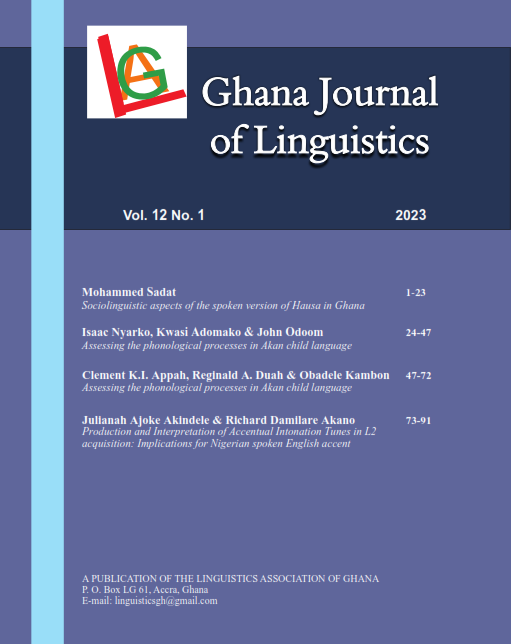Sociolinguistic aspects of the spoken version of Hausa in Ghana
DOI:
https://doi.org/10.4314/gjl.v12i1.544Keywords:
Ghanaian Hausa, zongo, sociolinguistic, language, GhanaAbstract
Even though Hausa is not an indigenous Ghanaian language but it plays a very important role in Ghana’s sociolinguistics. It is the lingual franca for many people living in the zongos. Zongos are located in every major city in Ghana and they are occupied by different ethnic groups who use Ghanaian Hausa for their daily communications. Some popular and vibrant market centers in Ghana also use Ghanaian Hausa for their trading activities. However, there is no study that discusses both the features of Ghanaian Hausa and its social context. This explorative paper examines the current state of Hausa spoken in Ghana. It first discusses its historical and social contexts of use. Then, the paper examines its linguistic features in comparison with varieties of Hausa spoken outside Ghana (Nigeria) by drawing on data gathered from Ghanaian Hausa speakers and native speakers of Hausa who hail from Nigeria. The paper argues that Ghanaian Hausa is unique from the target Hausa from Nigeria, it is the first language for some residents in the zongos, it is widely used on some of the national televisions, radio stations and market centers, and it is the medium of instruction in the Islamic schools (makaranta). The paper proposes that the Hausa learnt and spoken in Ghana is best described as a Ghanaian Hausa because its peculiar features.
References
Adamu, M. 1978. The Hausa factor in West African history. Oxford: Oxford University Press.
Agyekum, K. 2010. Language shift: A case study of Ghana. Journal of Sociolinguistics
Studies,381-https://www.researchgate.net/publication/250014808, 18/05/2022
Amfani, A.H. 2006. Four Decades of Language & Linguistic Studies in Hausa (1960 – 2000). An Encyclopaedia of The Arts 4 (5), 529-544.
Anderson, D.M., Killingray, D., 1991. Consent, coercion and colonial control: policing the empire, 1830–1940. In: Anderson, D.M., Killingray, D. (Eds.), Policing the Empire: Government, Authority and Control,1830–1940. Manchester University Press, Manchester and New York.
Anyidoho, A and Dakubu, M.E.K. 2008. Ghana: Indigenous Languages, English, and an Emerging National Identity. In Andrew Simpson (ed.) Language and National Identity in Africa.pp.140-157.OUP.
Amuzu, E. 2010. Linguistics: LING 437 Pidgin and Creole Languages. Accra: Institute of Continuing and Distance Education, University of Ghana.
Dakubu, M. E. K. 1977a. A Note on Hausa in Ghana. Papers in Ghanaian Linguistics. 2: 14-22.
Dakubu, M. E. K. 1997b. Korle Meets the Sea: A Sociolinguistic History of Accra. New York : Oxford University Press.
Dakubu, M. E. K. 1988. Other Languages Used in Ghana in Mary. Esther Kropp Dakubu, (ed.), The Languages of Ghana (pp163-171). London: KPI Ltd.
Fasold, R. 1984. The Sociolinguistics of Society. Oxford: Blackwell.
Garret, P. B. 2006. Language contact and contact languages. In A. Duranti (ed.) A Companion to Linguistic Anthropology 46–72. Malden: Blackwell.
Gillespie, W.H., 1955. The Gold Coast Police: 1844–1938. The Government Printer, Accra.
Killingray, D., 1991. Guarding the extended frontier: policing the Gold Coast, 1865–1913. In:
Anderson, D.M., Killingray, D. (Eds.), Policing the Empire: Government, Authority and Control, 1830–1940. Manchester University Press, Manchester and New York.
Kochetov, A. 2010. Palatalization. In: Colin Ewen, Beth Hume, Marc van Oostendorp, and Keren Rice (eds.) Companion to Phonology. Wiley Blackwell. http://www.companiontophonology.com 10/10/2021.
Holm, J. 1988. Pidgins and Creolse. Vol. 1: Theory and Structure. Cambridge: Cambridge University Press.
Howeiday, A. 1959. Concise Hausa Grammar. George Roland. London.
Huber, Magnus 1999. Ghanaian Pidgin English in its West African Context. Amsterdam: John Benjamins.
ModernGhana.com. 2012. BBC Hausa comes to Marhaba FM in Accra. ModernGhana.com.13/05/22.
NewsGhanna.com. 2012. BBC Hausa comes to Marhaba FM in Accra. NewsGhana.com.gh. 11/05/2022.
Newman, P. 2000. The Hausa Language: An Encyclopedic Reference Grammar. New Haven: Yale University Press.
Schildkrout, E. 1978. People of the Zongo: the Transformation of Ethnic Identities in Ghana. Cambridge: Cambridge University Press.
Sebba, M. 1997. Contact Languages: Pidgins and Creoles . London: Macmillan Press Ltd.
Tankabe, J. 2008. Colonialism, Legitimation, and Policing in Ghana. International Journal of Law Crime and Justice, 67-85.
Tijani, F. 2006. Some Selected Connectives in Hausa. M.Phil Thesis. Department of Linguistics. NTNU.
Trudgill, P. 2000. Sociolinguistics: An introduction to language and society. (Fourth edition.) London: Penguin Books.
Yankah, K. (2006) Education, Literacy and Governance: A Linguistic Inquiry Into Ghana’s
Burgeoning Democracy, Accra: Ghana Academy of Arts and Sciences.
Zoch, U. (2011). Hausa in Kumasi. In Petr Zima et al. ed. The verb and related areal features in West Africa. Continuity and discontinuity within and across Sprachbund Frontiers. Munich: Lincom Europa.

Downloads
Published
Versions
- 09/01/2023 (3)
- 09/01/2023 (2)
- 08/31/2023 (1)
How to Cite
Issue
Section
License
Copyright (c) 2023 Mohammed Sadat

This work is licensed under a Creative Commons Attribution 4.0 International License.
The Ghana Journal of Linguistics is published by the Linguistics Association of Ghana, P. O. Box LG 61, Legon, Accra, Ghana.
LAG Email: linguisticsgh@gmail.com. Website: http://www.laghana.org
GJL Email: gjl@laghana.org Website: http://www.laghana.org/gjl
© Linguistics Association of Ghana and individual authors, 2023.
